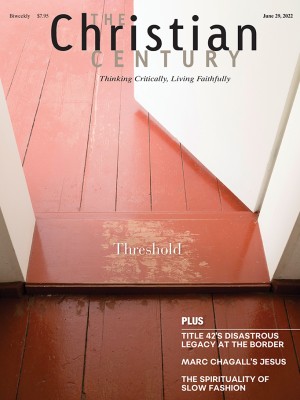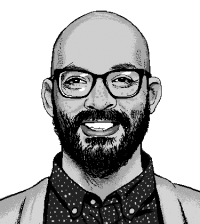White supremacy’s wee little men
Zaccheus doesn't mind the indignity of scrambling up a tree, as long as he’s on top.

When a word gets repeated enough it tends to lose some of its power. Words like racism, White supremacy, structural inequity—to those whose lives are less directly impacted by the realities these words point to, it can feel like they flooded suddenly into public consciousness. Books on race and White privilege shot onto the New York Times best-seller lists. And then, as such words seemed to be more widely accepted, their power and implication seemed to vanish, to dissipate like water poured on a hot skillet, transforming from drops to vapor to nothingness in a blink of an eye.
While the wider reckoning with racism in the United States came at a critical moment, so too did the inevitable backlash—the organization of denials and misdirection, the claims of censorship, the efforts to ban books, and the mystifying fear of the phantasm people refer to as “critical race theory.” The specter of race continues to haunt us. But how do we begin to face a ghost that so easily takes our resistance, absorbs it, and spits it out into mist?
Read our latest issue or browse back issues.
These are questions of faith. While the subjects of structural inequality and violence have clear sociological, historical, and psychological aspects, these are also theological questions, questions of who we believe ourselves and God to be. Desmond Tutu reminded us of the concept of ubuntu, that we “belong in a bundle of life.” Racism continues to haunt us and our faith—not simply for the ways it demonizes certain people but perhaps more profoundly for the way it normalizes certain other people. Within these dynamics of power, something happens to those whose lives sit inside the frame of normal, beautiful, strong, intelligent—or at least not ugly and poor like those others.
Inside this bubble of normalcy, people’s stories begin to revolve around their individual challenges. Inside this individuality—this idea that “I am just who I am” or that one’s sense of relationality is defined by the community one chooses—normalcy cultivates a space where one’s perceived disadvantages serve to paper over the power and privilege our bodies hold. Scripture gives us countless stories of these complicated tensions—of our needs, our connections to community, and the often problematic ways we try to create fulsome lives at the expense of others.
Luke 19:1–10 offers one such story: Zacchaeus, a chief tax collector. A “wee little man,” as the song says. He is described as a sinner, someone nobody is willing to move for when something exciting is coming into town. Because of his stature he is overlooked and likely ridiculed. And in his community he is a person to be feared, to be kept at a distance.
Yet Zacchaeus is also a wealthy man, a man with access to power. In countless everyday interactions he can make the lives of his neighbors a little more difficult. He understands the policies and protocols, how the system works, and he uses it to make himself rich.
In the normalcy created by a White supremacist system, you do not represent a group or a community—you’re just you. This just you-ness—your experience, fears, frustrations, and needs—becomes the primary lens through which you make decisions or discern what your life should look like. When Zacchaeus gives up trying to press himself through the crowd and scrambles up that sycamore tree, this speaks to something of the way he has tried to build his life. Perhaps, in his mind, his wealth has come despite the ridicule. He doesn’t mind. He doesn’t need them. He’s the one who’s been derided and ridiculed and pushed behind the walls. He pulled himself up. If they want to get ahead, they need to do what he had to do, even if that means the indignity of climbing a tree or becoming a tax collector.
But maybe Zacchaeus’s sense of discomfort and exclusion also obscures the power he actually holds—and more importantly, the way that power is drawn from the common community he is a part of. Maybe this is what Jesus sees in the tree as he walks down the Jericho road: a man who has lost his sense of what it means to belong and has knotted himself a life out of the little his neighbors held. Jesus looks at him up in that tree and tells him, “I need to come to your house.”
In the scramble to serve and get people seated, the clanging of dishes and scrape of chairs, suddenly the people Zacchaeus ignored or used are in his home. Jesus has broken down the barrier, torn apart the stories Zacchaeus told himself. Jesus shows him what true recognition and community look like. He shows him a bundle of life.
Zacchaeus responds with confession and reparation. He turns out his pockets and places on the table all his power and privilege in order to make right, to justify, to alleviate pain. Salvation is here, Jesus says to those who can hear. Salvation in this moment is not “oh I’m a sinner, I’m so awful.” It is Zaccheus’s recognition of what he is and what he owes and what he might contribute to the flourishing of his community. You have a part to play in this too, Jesus tells him. But you’re going to need to let go of that story you told yourself so you can recognize the power and the resources you hold.
Like Zacchaeus, you may have felt yourself excluded in any number of ways. But Whiteness affects all of us. In a world of White supremacy, there has to be more than good intentions and book lists. There needs to be the turning out of pockets after Jesus has invited himself to your house.
A version of this article appears in the print edition under the title “Wee little men.”






